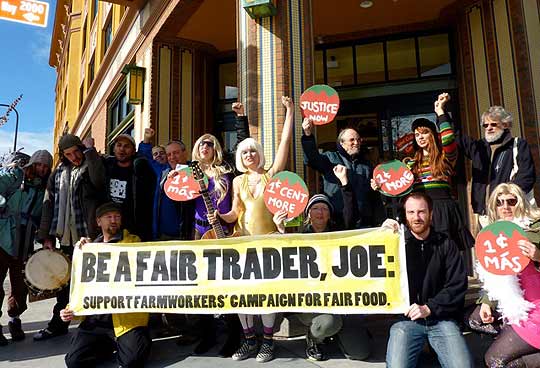
Plus… Trader Joe’s claims to sustainability coming under increasing scrutiny…
From the Massachusetts Board of Rabbis to the Unitarian Universalist Association of Congregations, religious leaders from Boston and across the Northeast are signing on to a letter calling on Stop & Shop and its parent company Ahold to “work with the CIW to do what is needed to bring the bounty of justice to all of our tables.”
Here’s an excerpt:
| “… As faith leaders, we are united in our call for better working conditions and higher pay for Florida farmworkers who labor in the tomato fields. Our traditions emphasize the dignity of every human being, and the responsibility of businesses and society at large to provide all workers with decent wages and working conditions. We are especially sensitive to migrant and seasonal workers who are most vulnerable to exploitation and abuse and who receive the least protection from U.S. labor laws. The demands of conscience, of the Godly requirements of justice and compassion, call us to support the Coalition of Immokalee Workers (CIW) in its Campaign for Fair Food…” |
It goes on to read:
| “… We call on Stop & Shop and its parent company, Ahold USA, to join with Whole Foods, McDonald’s, Taco Bell, and other food industry leaders by signing on to the Fair Food Code of Conduct and to pay an additional penny per pound for tomatoes. If the supermarket industry fails to pay into the penny-per-pound program and refuses to condition its purchases on the Fair Food principles recently agreed to by CIW and the Florida Tomato Growers Exchange, the gains made thus far will be undermined…” |
And it finishes:
| “… As the Rev. Dr. Martin Luther King Jr. teaches us, “In a real sense, all life is interrelated. The agony of the poor impoverishes the rich; the betterment of the poor enriches the rich. We are inevitably our brother’s keeper because we are our brother’s brother. Whatever affects one directly affects all indirectly.” Farmworkers, supermarkets, and consumers—we are all bound together. We urge Stop & Shop and Ahold to affirm this reality and work with the CIW to do what is needed to bring the bounty of justice to all of our tables.” read more |
If you are a member of the clergy or of a religious order and you would like to sign on to the letter, you can do so by going to the Interfaith Action website and filling out the electronic sign-on form that follows the letter.
 Also… It seems that Trader Joe’s claims of sustainability are getting a second look in light of the trendy grocer’s refusal to work with the CIW and do its part to support fairer conditions for farmworkers.
Also… It seems that Trader Joe’s claims of sustainability are getting a second look in light of the trendy grocer’s refusal to work with the CIW and do its part to support fairer conditions for farmworkers.
Two strongly critical articles were published in the last week on Trader Joe’s seemingly inexplicable stubbornness in response to the Campaign for Fair Food, one an editorial in the Washington Square News, the other a post on the environmental/sustainable food blog, grist.org.
The Washington Square News editorial captures the growing shift in consumer perception of Trader Joe’s in its final two paragraphs:
| “… We feel that what is most disappointing is the unwritten credo of Trader Joe’s and how it has been betrayed by the company’s refusal to acknowledge the workers’ demands. As consumers of its Union Square branch, we feel that we are strongly drawn to the store due to its reputation as an environmentally friendly and socially conscious corporation. Its recent behavior, however, has been anything but socially conscious and instead appears more irresponsible, avaricious and careless.
With its continued neglect of field worker’s rights, the “we” and the “you” on the Trader Joe’s “About us” page becomes more of a figure of PR fluff than a set of values by which the company abides. In doing so, the company is jeopardizing the set of corporate and consumer principles it has fought for years to solidify.” read more |
Certainly, if Trader Joe’s were claiming to sell Fair Trade coffee while refusing to pay the Fair Trade premium and instead paying the straight market price, consumers would be justifiably outraged. Fair Trade standards — including better wages and working conditions for the people who pick the coffee — are not without cost, and the Fair Trade premium is essential to making those improved conditions possible.
Clearly, for more and more consumers shopping at Trader Joe’s, claiming to sell ethically-sourced tomatoes from Florida while refusing to pay the Fair Food premium and instead paying the straight market price is likewise unacceptable.
